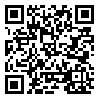BibTeX | RIS | EndNote | Medlars | ProCite | Reference Manager | RefWorks
Send citation to:
URL: http://mjiri.iums.ac.ir/article-1-2421-en.html
Background:Despite the efforts, the level of dental caries remains prevalent in developed countries It has increased in developing countries due to dietary changes. The aim of this study was to assess the effect of an educational intervention on the oral health of students in Chabahar city.
Methods: This quasi-experimental study carried out on 200 students selected with systematic cluster sampling from schools located in Chabahar city, (100 students in each case and control groups). The data was collected using a questionnaire before the intervention, that was lecturing on oral health, and immediately and 3 months later. Data were analyzed using the SPSS software version 11.
Results: The mean age of participants was 11.3 ± 1.3 years. The findings indicated that rate of oral self-care behaviors were significantly increased in the case group compared to the control group after the intervention (tooth brushing for twice a day 69%, Flossing tooth 34%, mouthwash 69%, and regular visiting a dentist 6% in case group versus 47% (p<0.002), 14% (p<0.001), 57% (p<0.03) and 5% (p<0.007) in the control group (, , , respectively.
Conclusion: Lecturing is an effective and cheap method on the promotion of oral health preventive behaviors particularly in deprived areas like Chabahar city.
| Rights and permissions | |
 |
This work is licensed under a Creative Commons Attribution-NonCommercial 4.0 International License. |





